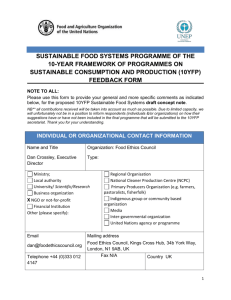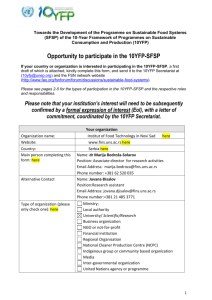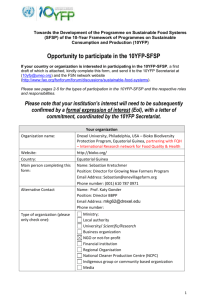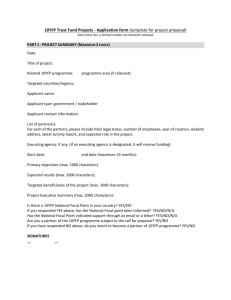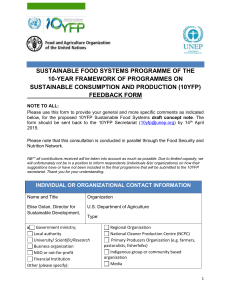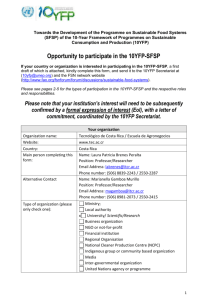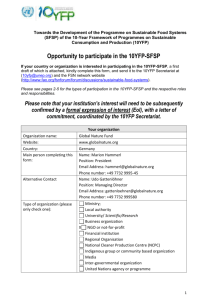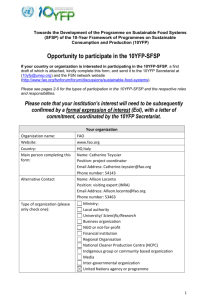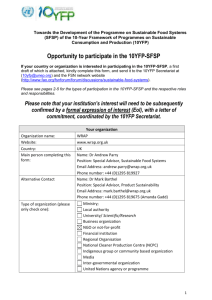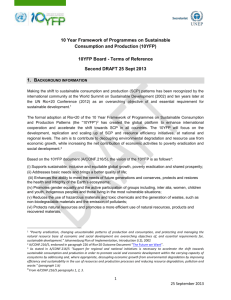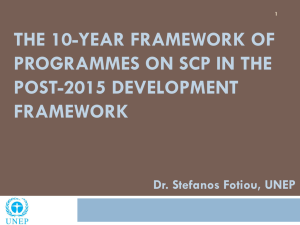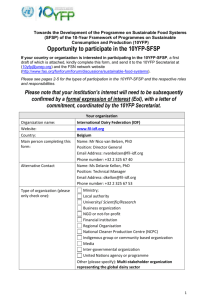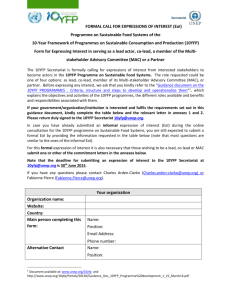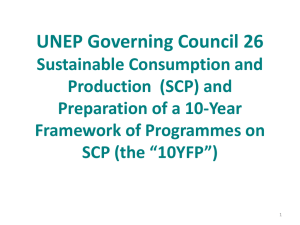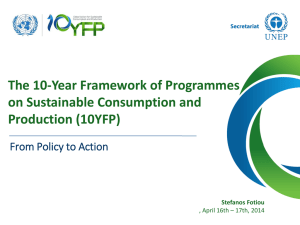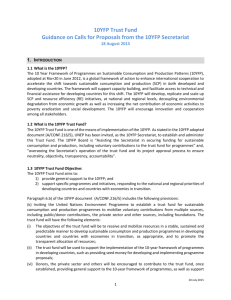Towards the Development of the Programme on Sustainable Food
advertisement
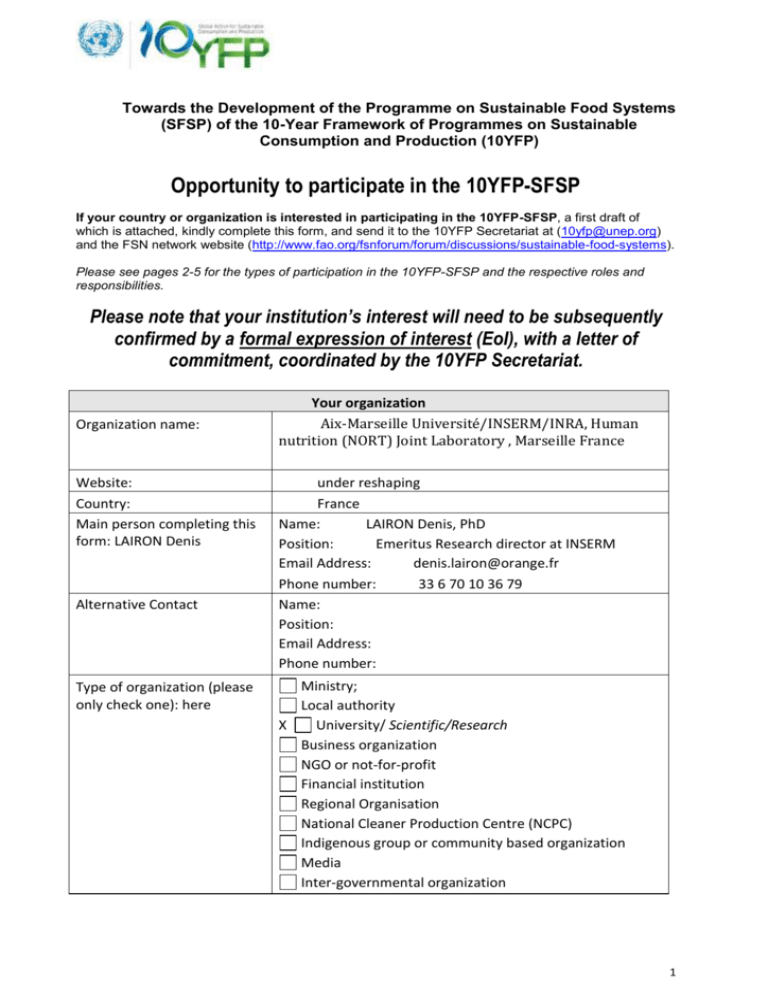
Towards the Development of the Programme on Sustainable Food Systems (SFSP) of the 10-Year Framework of Programmes on Sustainable Consumption and Production (10YFP) Opportunity to participate in the 10YFP-SFSP If your country or organization is interested in participating in the 10YFP-SFSP, a first draft of which is attached, kindly complete this form, and send it to the 10YFP Secretariat at (10yfp@unep.org) and the FSN network website (http://www.fao.org/fsnforum/forum/discussions/sustainable-food-systems). Please see pages 2-5 for the types of participation in the 10YFP-SFSP and the respective roles and responsibilities. Please note that your institution’s interest will need to be subsequently confirmed by a formal expression of interest (EoI), with a letter of commitment, coordinated by the 10YFP Secretariat. Organization name: Website: Country: Main person completing this form: LAIRON Denis Alternative Contact Type of organization (please only check one): here Your organization Aix-Marseille Université/INSERM/INRA, Human nutrition (NORT) Joint Laboratory , Marseille France under reshaping France Name: LAIRON Denis, PhD Position: Emeritus Research director at INSERM Email Address: denis.lairon@orange.fr Phone number: 33 6 70 10 36 79 Name: Position: Email Address: Phone number: Ministry; Local authority X University/ Scientific/Research Business organization NGO or not-for-profit Financial institution Regional Organisation National Cleaner Production Centre (NCPC) Indigenous group or community based organization Media Inter-governmental organization 1 Brief description of your organization (please include objective and main areas of interest) United Nations agency or programme Other (please specify): My organization is a Joint research laboratory dedicated to Human nutrition, obesity and cardiovascular/thrombotic risk. The laboratory research topics are all in these 3 specific areas with cross-cutting projects (food quality, nutrition and diet/ metabolic and health impacts). In addition to this, I have been working on projects dedicated to evaluate the nutritional and safety quality of organic foods and on the on-going Bionutrinet research project dedicated to evaluate organic food consumption and impacts as well as a research project on the sustainability of the Mediterreanean diet (MEDINA). Since 2009, I have been working in collaboration with FAO, Nutrition division, and CIHEAM on sustainable diets (definition in 2010) and indicators of sustainability. I have been working on Mediterranean diet pattern for more than 10 y. Please specify your proposed participation in the 10YFP-SFSP Type of proposed Lead actor participation Co-Lead actor Member of Multi-stakeholder Advisory Committee (MAC) Coordinator of a programme work area Partner What is your main motivation to be part of the 10YFP-SFSP? Please explain in a few paragraphs The organic food system, which emerged 100 years ago, has a definition, principles, standards and metrics. By now it has data from more than 160 countries, and regulations in force in more than 80 countries or regions. In line with my fields of activity as above, and as a partner of FQH we have thus began to develop an organic food system programme (OFSP) to be proposed as a Work Area for the new 10 Year Framework Programme on Sustainable Food Systems, under development. The objective of the OFSP is to build upon lessons learnt in the organic food system to better understand elements of sustainable diets and sustainable food systems in order to help countries with actionable recommendations. How could your country or organization contribute to the development and implementation of the 10YFP-SFSP? Together with FQH and other partners we will explore the experiences, insights and knowledge accrued within the organic food system for transferable, practicable findings supporting the overall transformation to sustainable diets and sustainable food systems. For 2 example, within the OFSP one project will focus on the notion/concept of a diversity of possible ‘organic diets’: Studies (the biggest in size and details in our Bionutrinet one) show that regular consumers of organic products have healthier life-style profiles and a better compliance with the sustainable diet concept. As global diets link sustainability and health, organic may be defined as a global, healthy and sustainable diet, taking into account regional and cultural adaptations. The project is placed within the Organic Food System Program (our proposed work area for the new 10 Year Framework Programme on Sustainable Food Systems). Myself and my research laboratory (along with national/international colleagues and cooperators) will actively contribute to this initiative. Please provide a brief description of your efforts in the field of sustainable food systems. In September 2014 FQH organized a joint workshop with CRA-NUT/Italy and FAO on assessing sustainable diets within the sustainability of food systems. FQH members/experts brought in current knowledge from the organic food system and pooled this with ongoing collaborations on identification of indicators and methods for assessing sustainable diets within the improvement of the sustainability of food systems, using the Mediterranean diet and the Mediterranean area as a case study. One aim of our proposed activity is to develop an actionable diet concept that can be regionally and culturally adapted, based on learnings from the organic food system. The thus developed organic diets may be taken as pilot models for sustainable diets within sustainable food systems. More specifically, I have been working on projects dedicated to evaluate the nutritional and safety quality of organic foods (coordinator of a working group/report at AFSSA (French food safety agency); paper in scientific journal in 2010, chapter in a book in 2014. I am an active member of the on-going ministry-funded Bionutrinet research project dedicated to evaluate organic food consumption and impacts through a nation-scale, prospective, human adult cohort survey, the biggest in the world (first paper in PlosOne, 2013 on 54 300 subjects) . Since 2009, I have been working in collaboration with FAO, Nutrition division, and CIHEAM on sustainable diets (definition in 2010) and indicators of sustainability. I have been working on Mediterranean diet pattern for more than 10 y within a dedicated scientific expert group. I am an expert member of the French Scientific council of organic agriculture and of the Scientific council of French Afterres 2050 sustainabilty scenario. As the representative of my organization/government, I confirm that the information is correct and true. Date: March 27, 2015 Name Denis LAIRON 3 Before expressing any interest, please, kindly read carefully the “Guidance document on the 10YFP PROGRAMMES : Criteria, structure and steps to develop and operationalize them”1, which explains the objective and activities of the programme, the different roles available and benefits and responsibilities associated with them. Immediately below you will find a summary of the role and responsibilities of the Lead and Co-leads, Multi-stakeholder Advisory Committee (MAC) members, and Partners of the programme. These will be set out in more detail in the formal Expression of Interest form that you will receive subsequently from the 10YFP Secretariat. ____________________________________________________________________ Role and Responsibilities of the Lead and Co-leads of a 10YFP Programme: Support the overall coordination of the programme implementation and proactively fundraise for the programme; Provide financial and/or in-kind contribution, including dedicated staff in support of a “Coordination Desk” (each programme will need a minimum of 1-2 full time staff to start operating); Jointly supervise the work of the Coordination Desk (whose tasks could be executed from different geographical locations); Chair and co-chair the MAC meetings, facilitate the decision-making within the Committee and support its activities, including those related to securing support from the 10YFP Trust Fund; Act as liaison and focal point for contacts between the Secretariat and the SFS programme and all its partners; Report on progress and outcomes as required, including through the preparation of an annual report for the 10YFP Secretariat to convey to the Board and to be included in the 10YFP report to ECOSOC. Criteria for lead and co-leads: Any government from any UN member state relevant regional or national organizations, international organizations (including UN agencies), industry or business organizations, non-governmental/civil society organizations or academic institutions, or any other entity that supports the goals of the 10YFP (www.unep.org/10yfp) and agrees to work towards them can apply to become a lead or a co-lead of a specific 10YFP programme. The lead and co-lead(s) should: • demonstrate an active or leading role in supporting the shift towards sustainable consumption and production patterns at national and/or regional levels; • provide resources (including in-kind contributions or expertise) for coordination 1 Document available at: www.unep.org/10yfp and http://www.unep.org/10yfp/Portals/50150/Guidance_Doc_10YFP_Programme%20development_1_V1_March14.pdf 4 and implementation of activities under this programme; and • ensure minimum commitment to remain engaged for at least four years. Role and Responsibilities of the MAC of a 10YFP Programme: review goals, objectives and measures of success, based on the initial programme’s work plan, with the aim of providing guidance on progress towards more sustainable consumption and production patterns; review on the performance and evolution of the programme’s work plan, advise on and proactively engage new partners, initiatives and activities in the line with the objectives of the programme, as well as in response to emerging demand and priorities; enhance synergies and cooperation among stakeholders within the programme as well as with other programmes of the 10YFP; propose projects and/or activities for implementation in accordance with the work plan of the programme; provide guidance to the 10YFP Secretariat for the elaboration of calls for proposals for the 10YFP Trust Fund, in the area of the programme, and to screen and short list proposals received based on established criteria; Criteria for the members of the Multi-stakeholder Advisory Committee Any government from any UN member state relevant regional or international organizations, industry or business organizations, non-governmental/civil society organizations or academic institutions, or any other entity that supports the goals of the 10YFP and agrees to work towards them can apply to become a member of the MAC of a specific programme. The composition of the MAC ideally could reflect a diversity of partner categories and geographic regions, in this context, members of the MAC should: demonstrate strong interest and/or recognized expertise and experience, if possible reflected in policies and actions, in the area of the programme; have played an active or leading role in supporting the sustainable consumption and production and/or sustainable development agenda at the national and/or regional levels. Role of Coordinators of the Programme Work Areas Coordinators of a programme work area are not necessarily members of the MultiStakeholder Advisory Committee, but can take an active role in coordinating one or more of the programme work areas. When coordinating a work area of the programme, they are responsible for ensuring that the related activities are delivered in an inclusive and effective manner. They bring their expertise, expand their networks and partnerships, build synergies and help scale-up and replicate best practices on SCP at all levels. 5 ____________________________________________________________________ Role of Partners Any stakeholder supporting implementation and/or benefiting from the activities of the programme could be a partner of a programme. Those activities include workshops, trainings, making use and supporting dissemination of the materials, including policy and capacity-building tools and reports produced by the programme. Partners do not necessarily need to provide technical and/or financial support. Thank you very much for your time., 6
